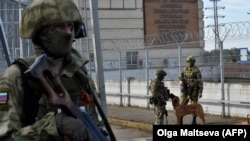On August 7, Ukrainian President Volodymyr Zelenskyy said that if Moscow proceeded with pseudo-referendums on joining Russia in the occupied Kherson and Zaporizhzhya regions, there could be no negotiations to end the war.
The next day, Dmitry Peskov, spokesman for Russian President Vladimir Putin, denied that the Kremlin was organizing the referendums. Peskov said:
“The fact is that these are the plans of the residents of the regions. It's not us holding a referendum.
“Here, apparently, it is necessary to understand to whom Mr. Zelensky addresses this statement: to the citizens of Ukraine’s mentioned regions or to the citizens of Russia. If he is addressing citizens or the leadership of Russia, then, in this case, we are the wrong address.”
This notion that Russia has nothing to do with referendum plans is false.
By mid-March 2022, almost the entire territory of the Kherson region and about 70 percent of the Zaporizhzhya region of Ukraine had been captured by Russian forces in Putin’s illegal invasion.
After establishing control, Russian occupation authorities appointed administrative leaders. According to the Ukrainian law, heads of local state administrations are proposed by the Cabinet of Ministers of Ukraine and appointed by the president of Ukraine, not by Russian proxies.
Russia appointed Volodymyr Saldo as head of the administration of the Kherson region in April. He had been mayor of Kherson from 2002 to 2012 (three terms) and a deputy of the Verkhovna Rada, Ukraine's parliament.
On August 5, 2022, Russian media reported that Saldo was hospitalized amid speculation that he may have been poisoned or had a stroke. A deputy blamed Ukrainian disinformation.
Evgeny Balitsky was appointed in May by the Kremlin as administrator of the occupied part of the Zaporizhzhia region. He also is a former deputy of the Verkhovna Rada. In 2017, the prosecutor's office of Ukraine opened a criminal case against Balitsky for advocating seccession. Since 2018, he has lived in occupied Crimea.
The pre-occupation Ukrainian administrators in the Kherson and Zaporizhzhya regions did not announce any referendums before they were removed by the Russian occupation forces. According to Article 73 of Ukraine’s constitution, a referendum concerning the country's territorial integrity must be held nationally.
Russia, meanwhile, is quickly russifying the areas of Ukraine it has occupied by integrating financial, educational, energy and transportation systems.
In May, Russian Deputy Prime Minister Marat Khusnullin became the first high-ranking Russian government official to visit the occupied portion of the Zaporizhzhya. A member of the region’s Russian-controlled council of military-civil administration, Vladimir Rogov, told the Russian business daily Vzglyad that Khusnullin’s visit foreshadowed “the fact” that Zaporizhzhya would “become part” of Russia’s Southern Federal District.
Vzglyad reported that following Khusnullin’s visit, the Russian government promised to start paying pensions and salaries in the Zaporizhzhya region in rubles.
The Russian-appointed deputy head of the Kherson region administration announced on June 16 that children born in the area after February 24, as well as orphans, would automatically receive Russian citizenship.
Russian Education Minister Sergey Kravtsov announced on July 10 that, starting in September, the occupied portion of Zaporizhzhya would switch to the Russian education system.
Commenting on a referendum planned in Kherson, the British Ministry of Defense said on July 3 that Russia is “likely prioritizing a pseudo-constitutional vote in an attempt to legitimize its control of the region.”
Precisely when the Kherson referendum will be held remains unclear. On August 3, Russia’s state-owned RIA Novosti news agency quoted Khusnullin as saying: “As part of the preparations for the [Kherson] referendum, much work needs to be done; we need to help repair both schools and polling stations.”
After Russian troops illegally swept into Ukraine's Crimean Peninsula in 2014 and took control of security and military forces, the Crimean parliament voted to secede and scheduled a referendum on the matter. With gun-toting soldiers at polling places, it passed with 97 percent of the vote.
Speaking last month about Russia’s territorial plans in Ukraine, U.S. National Security Council spokesman John Kirby said that, according to U.S. intelligence, the Kremlin plans to replicate the Crimea annexation.
“Already, Russia is installing illegitimate proxy officials in areas of Ukraine that are under its control. … First, these proxy officials will arrange sham referendums on joining Russia. Then, Russia will use those sham referendums as a basis to try to claim annexation of sovereign Ukrainian territory.”
Top Russian officials have said as much.
Sergei Kiriyenko, Putin’s deputy chief of staff, visited the Kherson and Zaporizhzhya regions at the beginning of June and said the areas would be annexed to Russia. "The inclusion of the Kherson region into Russia will be full-fledged, by analogy with the entry of Crimea," Kiriyenko said.





